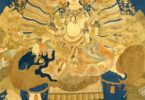《百喻经》
[The] Sūtra [Of A] Hundred Parables
(九四)摩尼水窦喻
[94] Parable [Of The] Maṇi [Or] Water Burrow
昔有一人与他妇通,交通未竟夫从外来,即便觉之住于门外,伺其出时便欲杀害。
[In the] past, [there] was a person with another [person’s] wife [committing] adultery. [With] intercourse yet [to be] complete, [the] husband from [the] outside came. Immediately aware of [him, he] stood at [the] door outside, waiting [for] him [to come] out, then desiring [to] kill [him].
妇语人言:「我夫已觉,更无出处,唯有摩尼可以得出(摩尼者齐云水窦孔也)。」
[The] wife spoke [to the] person, saying, ‘[As] my husband [is] already aware, [you are] further, without [a] place [to go] out. Only with [the] maṇi can [you] get [a way] out. (That “maṇi” [is] similar [to] saying “water burrow’s hole too.”)’
[Note 1: A maṇi (摩尼) in terms of a treasure gem (宝珠) is able to fulfil wishes.]
欲令其人从水窦出,其人错解谓摩尼珠,所在求觅而不知处,即作是言:「不见摩尼珠我终不去。」须臾之间为其所杀。
Desiring [to] lead that person [to be] from [the] water burrow [getting] out, that person wrongly understood [that] said [to be a] maṇi gem. [At] that place seeking [it], yet not knowing [the] place, [he] then made this statement, ‘[If] not seeing [the] maṇi gem, I, [in the] end, cannot go.’ [In] a moment between, [he was] by him that killed.
凡夫之人亦复如是。有人语言:「生死之中无常苦空无我,离断常二边,处于中道,于此中过可得解脱。」
Of ordinary beings’ people, [they are] likewise thus. [There] are people saying, ‘Within that [cycle of] birth [and] death, [it is with] impermanence, suffering, emptiness [and] without self. Departing [from] nihilism [and] eternalism, [these] two [extreme] sides, abide on [the] Middle Path. On this Middle [Path] crossing can [there be] attainment [of] liberation.’
[Note 2: Basically, nihilism (断见) is the extreme (and wrong) view that after this life ends, there will be absolute nothingness, in terms of karmas (业) or rebirths (轮回). Eternalism (常见) is the other extreme (and also wrong) view that after this life ends, there will be permanent ‘somethingness’, in terms of eternal heaven or eternal hell. There can be variations in beliefs of what is lasting or not.]
[Note 3: The Middle Path (中道) between nihilism, (which believes the consciousness ends in death) and eternalism, (which believes the consciousness remains in a fixed state after death), is the truth that there is continual changing of the consciousness, (thus not with it ending to become nothing at all, thereby refuting nihilism, or with it remaining as something fixed forever, thereby refuting eternalism).]
凡夫错解,便求世界有边无边及以众生有我无我,竟不能观中道之理,忽然命终,为于无常之所杀害,堕三恶道,如彼愚人推求摩尼为他所害。
Ordinary beings [with] wrong understanding, then seek [to know if the] world has boundaries [or is] without boundaries, and with sentient beings having self [or are] without self. In the end not able [to] contemplate principles of [the] Middle Path, suddenly [when] life ends, by [that] of impermanence [as] those killed, falling [into the] three evil paths, [they are] like that foolish person inquiring on [the] maṇi, by another that harmed.
[Note 4: The three evil paths (三恶道) are the (i) hell-beings’ path (地狱道), (ii) hungry ghosts’ path (饿鬼道) and (iii) animals’ path (畜生道).]
Namo Amituofo : Translation and notes by Shen Shi’an
上个喻
Previous Parable:
老母捉熊喻
[93] The Parable Of The Old Mother Catching A Bear
https://purelanders.com/2023/10/12/93-the-parable-of-the-old-mother-catching-a-bear-from-the-sutra-of-a-hundred-parables
下个喻
Next Parable:
二鸽喻
[95] The Parable Of The Two Doves
https://purelanders.com/2023/10/12/95-the-parable-of-the-two-doves-from-the-sutra-of-a-hundred-parables
全百喻
All Hundred Parables:
https://purelanders.com/baiyu





